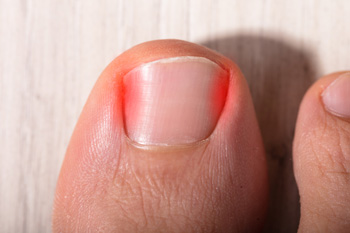
Ingrown toenails, a discomfort that can disrupt the rhythm of your daily life, often stem from a combination of factors. The primary cause lies in the toenail's edge growing into the surrounding skin, triggering inflammation and pain. Improper toenail trimming, wearing tight shoes, or sustaining injuries to the toe can contribute to this unwelcome development. Recognizing the signs of an ingrown toenail is vital for timely intervention. Persistent pain, redness, and swelling around the toenail, coupled with potential drainage of pus, signify the onset. If left untreated, ingrown toenails can escalate into infections, posing greater challenges. Understanding the causes and recognizing early signs empowers individuals to address ingrown toenails promptly, restoring comfort and preserving the health of their feet. Ingrown toenails can be a serious foot condition. If you have symptoms of this ailment, it is suggested that you schedule an appointment with a podiatrist as quickly as possible who can offer you correct treatment options.
Ingrown toenails may initially present themselves as a minor discomfort, but they may progress into an infection in the skin without proper treatment. For more information about ingrown toenails, contact Dr. Tupper of Coshocton Foot Health Center. Our doctor can provide the care you need to keep you pain-free and on your feet.
Ingrown Toenails
Ingrown toenails are caused when the corner or side of a toenail grows into the soft flesh surrounding it. They often result in redness, swelling, pain, and in some cases, infection. This condition typically affects the big toe and may recur if it is not treated properly.
Causes
- Improper toenail trimming
- Genetics
- Improper shoe fitting
- Injury from pedicures or nail picking
- Abnormal gait
- Poor hygiene
You are more likely to develop an ingrown toenail if you are obese, have diabetes, arthritis, or have any fungal infection in your nails. Additionally, people who have foot or toe deformities are at a higher risk of developing an ingrown toenail.
Symptoms
Some symptoms of ingrown toenails are redness, swelling, and pain. In rare cases, there may be a yellowish drainage coming from the nail.
Treatment
Ignoring an ingrown toenail can have serious complications. Infections of the nail border can progress to a deeper soft-tissue infection, which can then turn into a bone infection. You should always speak with your podiatrist if you suspect you have an ingrown toenail, especially if you have diabetes or poor circulation.
If you have any questions, please feel free to contact our office located in Coshocton, OH . We offer the newest diagnostic and treatment technologies for all your foot care needs.
